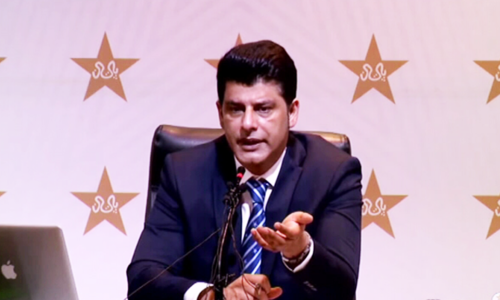The timing of it was just like one of Babar Azam’s exquisite drives through the arc between point and extra cover. While departing simultaneously and leaving the rest of the backroom staff in the dark, both Misbah-ul-Haq and Waqar Younis have obviously read the writing on the wall — about what’s in store.
Deep down in their hearts both the head coach and his bowling assistant were in no mood to get caught in the crossfire that is inevitably going to take place if this Pakistan squad of no-hopers flops at the Twenty20 World Cup.
Make no mistake about it the questionable selections for the mega event have already hit the social media with a vengeance. Recalling the non-performing Asif Ali for the umpteenth time and the extremely shocking induction of the awfully inexperienced Azam Khan are among the worst possible choices one can imagine for a global competition.
There is certain to be a ruthless scrutiny of decision-making abilities of chief selector Mohammad Wasim, who chose the ‘best’ 15 players in his own words. Evaluating the World Cup selections, it obviously seems that he has hardly done any homework for the most crucial assignment of his 10-month tenure in the hot seat.
Regardless of whatever excuses Misbah has given, his abrupt departure — with him and Waqar both still having a year left in the contracts they had inked in the post-2019 World Cup — has directly impacted on the squad selection if one takes into the equation the incongruous Pakistani method in which the inputs of captain and head coach matter.
Misbah had reportedly opposed Azam’s inclusion for Pakistan’s most recent tours to England and the West Indies but also said at the time the burly wicket-keeper/batter should be judged after being tested at the international level. “To be very honest, I don’t think you can judge a player on the basis of one or two innings. Once he will play more, only then we can figure out if he is good enough to compete at this level.”
Given the fact that Azam had just played two innings in three T20 Internationals, it does merit an open debate to dissect his credentials. There is no denying his overall T20 stats — 982 runs in 50 appearances — a strike-rate of almost 150 (149.92) which is much higher than any wicket-keeper/batter currently playing in the country, including the incumbent Mohammad Rizwan, the leading run-getter in T20 Internationals this year.
But lack of enough international exposure is Azam’s biggest drawback, while questions have been repeatedly raised about his massive physique and overall fitness because his keeping standard is not that classy type that one can associate with all those have had represented Pakistan — that list also features his father Moin Khan.
There is something about Asif Ali that other batters in Pakistan cricket really don’t possess. There is someone who has been really considerate towards the 29-year-old right-hander. How come he manages to get the nod every now and then, while literally doing nothing spectacular, supposedly as an explosive hitter? The stats never lie and in Asif’s case they are spot on — a T20 career strike-rate of 147.02 does say something else but when one compares this segment with his international rate of scoring, there is a marked difference of 23.28.
One just cannot recollect when did Asif singlehandedly change the complexion of a Pakistan T20 International innings? The answer to this query is still being anticipated in hope. Debuted in April 2018, he hasn’t ever cemented down a middle-order place in international cricket and across 27 innings he had scored 344 runs with a highest of 41 not out against a rather innocuous Zimbabwe attack at Harare in July 2018.
Asif’s recent numbers make depressing reading while he has been globetrotting endlessly to fulfil his obligation in the countless franchise-based leagues. In the ongoing Caribbean Premier League, Asif has been an abject failure for current leaders St Kitts Nevis Patriots’ with scores of 8, 2, 4 and 18.
And even if the laptop-obsessed chief selector — who famously unveiled his maiden Pakistan squad for the Test series against South Africa last January with a plethora of statistics to support his selections in front of a crowded media in Karachi — still considers the over-rated Asif as the ‘game-changer’ to play a pivotal part in the forthcoming World Cup.
And just like his predecessors on the national selection committee used to do, Wasim probably overlooked the fact that Asif — the favourite of whoever that be — hadn’t played a T20 International on the UAE soil in the past three years and boasts a strike-rate of 109.72 across six matches on the slow-paced pitches of Dubai and Abu Dhabi.
Moreover, there are further question marks over some of the other selections — like in the case of Khushdil Shah who has been preferred to fill up one of the batting slots after the dramatic demotion of Fakhar Zaman to the ranks of reserves and the catastrophic axing of Sharjeel Khan. But the left-handed Khushdil had hardly got a proper run during the Misbah era to justify his undoubted potential as a powerful striker of the white ball.
Published in Dawn, September 8th, 2021














































